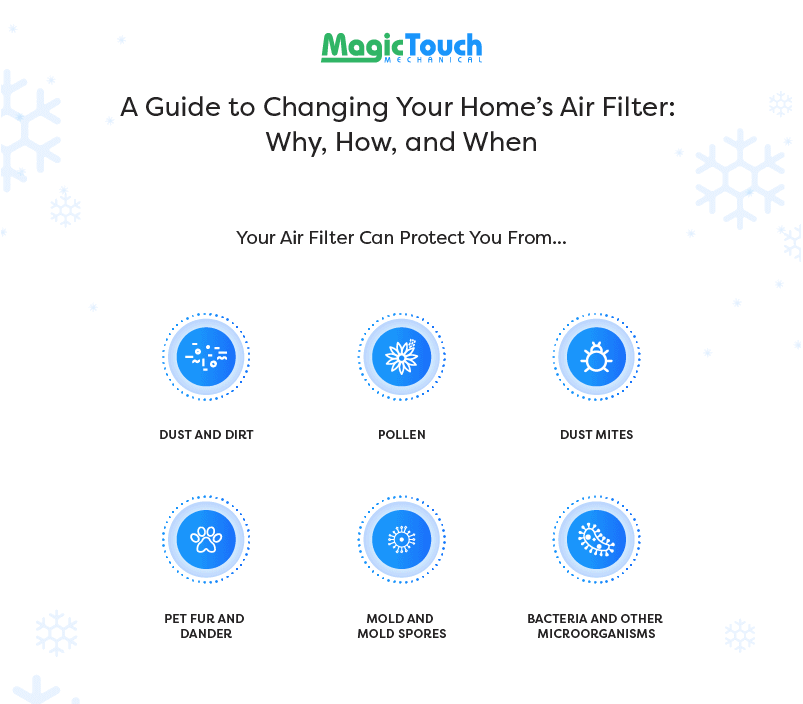A Guide to Changing Your Home’s Air Filter: Why, How, and When
Replacing your AC’s air filter. You know it should be done, but let’s be honest; you only think about your air conditioning unit when it breaks down. Once you find where the filter is located, how do you know how to remove and replace it? Does it even really matter?
Let’s be clear about something: If you breathe air, and you own an HVAC system, then yes. It does really matter! Waiting for your technician to change the filter during your yearly tuneup simply isn’t enough.
Even if you’re an old hand at replacing the air filter on your A/C unit, you may wonder how often it’s necessary, and why. This complete guide will help you better understand the purpose and proper maintenance of your air conditioning filtration system.
What Is the Purpose of Your AC’s Air Filter?
The air filter does just what its name suggests: it filters the air that’s drawn into your air conditioning system. It prevents dust, particulates, and debris from being pulled in and circulated through your air conditioning unit. Since this air is subsequently circulated throughout your entire home, the air filter is your first line of defense against indoor pollution. Indoor air pollution is a growing problem that significantly impacts your health and that of your family.
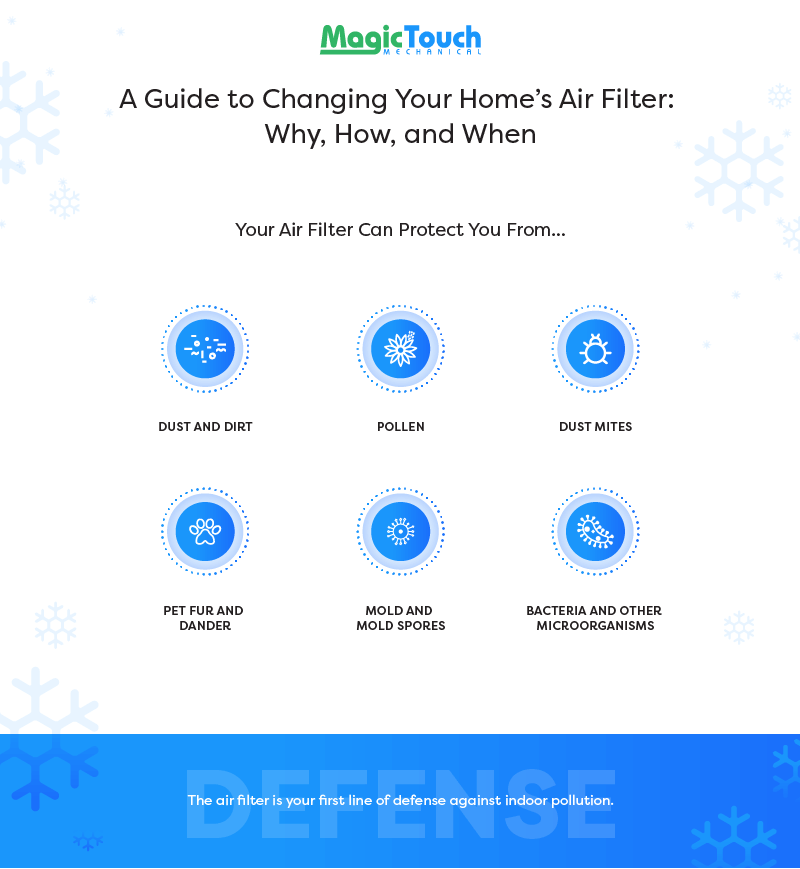
Why Should You Change the Filter?
The exact recommendations for changing (or cleaning, if it’s non-disposable) your filter will vary depending on a number of factors. For example: frequency of use, your unit type, your family’s health, and environmental conditions. The filter should be changed regularly in order to protect both your A/C unit and the health of your family. Otherwise, not only does it negate the original function of the filter, but it can also cause major problems for your air conditioning unit’s performance and efficiency.
- Save money on the AC bill: A congested filter forces your unit to work much harder to cycle air, causing higher bills each month and reduced cooling power. Simply changing the filter can improve your unit’s efficiency 5–15%.
- Clean the air: According to the EPA, indoor air is 2–5 times more polluted than outdoor air, on average. In some conditions, indoor air can be up to 100 times more polluted than the outdoor environment. Considering we spend 90% of our time indoors, this is a major concern.
- Be more eco friendly: If the monthly energy bill isn’t enough motivation for you to improve your air conditioner’s efficiency, consider the impact on the environment.
- Reduce strain and wear on your unit: A high percentage of air conditioner breakdowns are caused by particulates and debris getting into the unit. Improperly circulating air causes damage to many of your AC unit’s components. It can cause the evaporator coil to freeze over, the blower fan to wear out, or even the compressor to completely fail.
- Reduce risk of airborne illness: Microorganisms can circulate through our home when our central air system isn’t properly filtered. This increases your risk of allergies, bacterial infections like strep throat, and even fungal infections like valley fever, which is a common (and sometimes serious) problem in the Greater Phoenix Area.
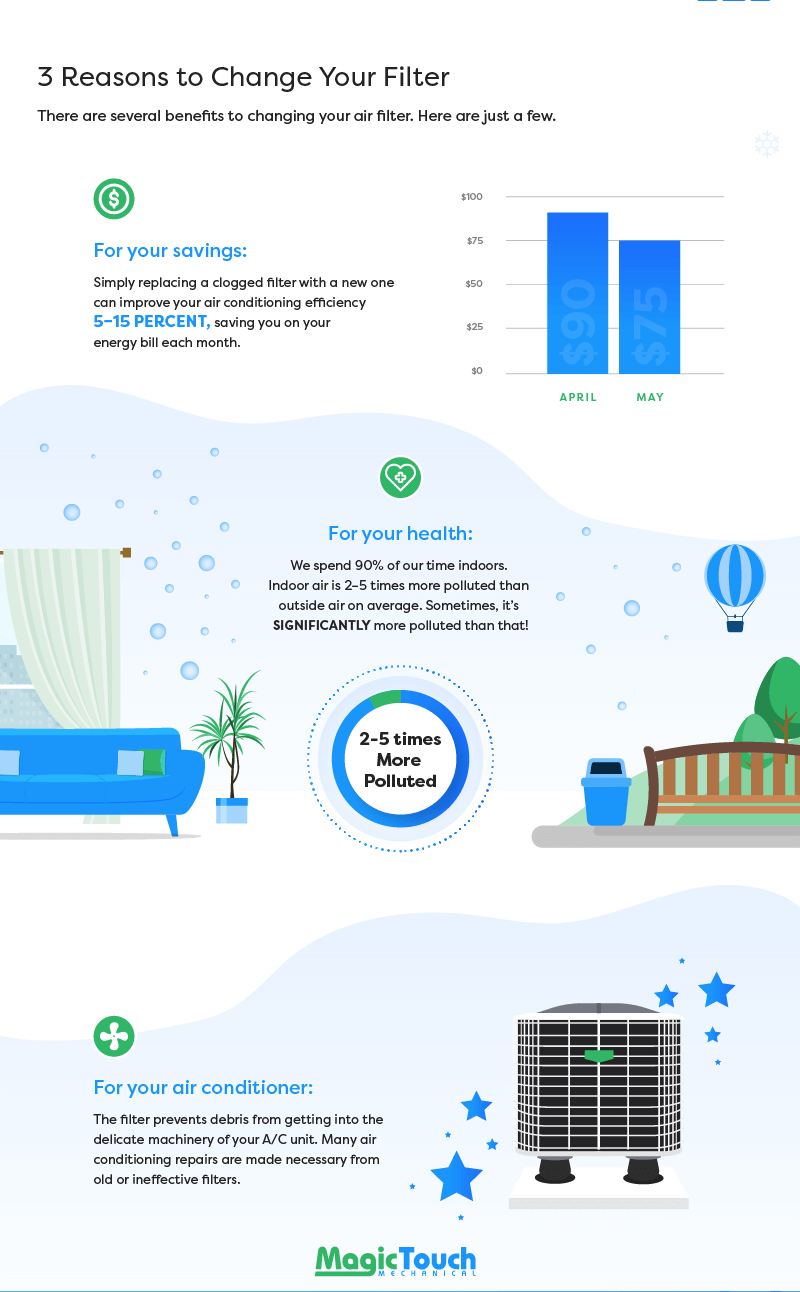
A General Overview of Filter Types
Air filters are made of a porous meshed fiber–usually spun fiberglass, polyester, or cotton–that allows air to pass through, but traps small particulates. Of course, there are many different ways to engineer this porous material, and different filters will all have different levels of effectiveness.
- Flat-panel fiberglass filters: These are semi-effective at protecting your A/C unit, but don’t make a significant difference in indoor air quality.
- Pleated media filters: This is usually the most energy- and cost-efficient option for cleaner air, and takes care of common allergens and pollutants.
- High efficiency pleated filters: These usually offer the highest filtration available in the casual consumer marketplace.
- HEPA-grade filters: Short for High-Efficiency Particulate Air, these filters are also known as “hospital grade” and are used in ORs and clinics around the world.
By and large, you can determine how effective a filter is by its MERV rating. MERV stands for Minimum Efficiency Reporting Value, a grading system specially for air filters. This rating is a number ranging from 1 to 20, depending on the size of particulates it’s capable of catching and trapping. This will help you know which contaminants you’re protecting against… and which ones you’re not.
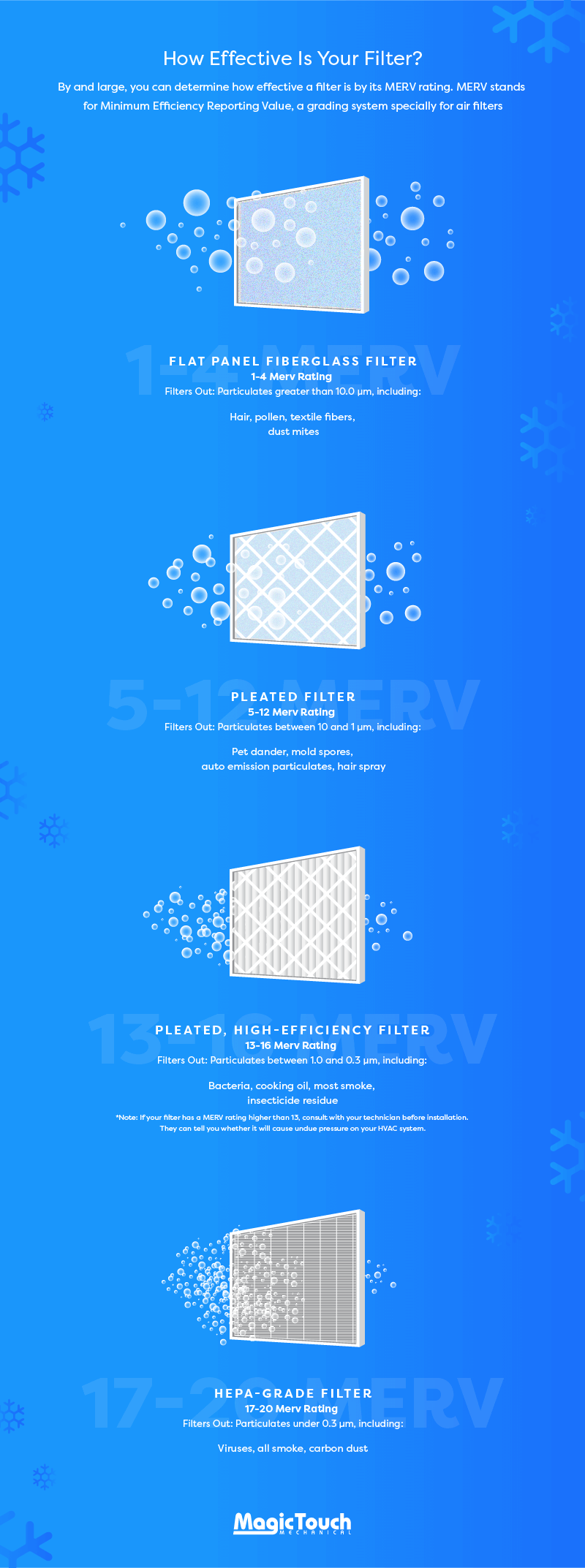
Choosing the Right Filter for You
Choosing the right filter for your home will depend on a few factors. First of all, what are your needs? If you have someone in the home who’s at a high risk of viral and bacterial infection, you may need to find an advanced option–either a HEPA-grade filter, or an electronic air scrubber (which is different from a filter, but also works to purify your air.) If you have pets and are concerned about allergies, a pleated filter with a MERV rating of 8–10 may do the trick for you. If you aren’t very concerned about indoor air quality, but simply want to ensure that your air conditioning unit is protected and running at a high efficiency, a basic fiberglass filter is an option (although it’s important to note that this is not ideal for the cleanliness of your indoor air).
When a Higher MERV Rating Isn’t Better…
Before you jump straight to the assumption that you should simply choose the highest MERV rating that your budget will allow, don’t forget the second factor in this decision… your air conditioning unit. Consider this: if it’s hard for pollution and fine particulates to get through your filter, it will also be harder for air to get through. Installing a filter with a significantly high MERV rating could cause excess pressure on your AC unit, just as a dirty, unchanged filter can. Determining what your unit can handle will take a “static pressure” (or air flow) test. If you have high static pressure (aka poor airflow) then it may be unwise to install a hospital-grade filter before the problem is fixed.
Now, the solution is NOT to resign yourself to a lifetime of allergies and poor air flow. Instead, you should call a professional like Magic Touch Mechanical to diagnose the cause of your high static pressure, get it fixed, and then start effectively filtering your indoor air with a better A/C filter. Our air quality experts at Magic Touch Mechanical can conduct a static pressure test that will help you know what kind of filter is suitable for your needs. We can also provide expert advice on how you can best maintain the air quality in your home. In fact, we employ technicians who hold specific certifications in healthy buildings and indoor air quality.
How to Change Your Air Filter
If you’re new to caring for your own home, or you’ve recently moved, here’s a step-by-step guide to help you effectively change your air filter. Since this will be a regular task throughout your life, it’s important to familiarize yourself with the process as soon as possible.
- Find the filter: All central air conditioning systems have a filter. However, if you’re unfamiliar with the mechanics of an air conditioner, it may be hard to locate. Your first job is to locate your air conditioning unit. The filter will be located somewhere between the AC unit itself and the return duct (you’ll recognize it because it sucks in the air instead of blowing it out.) It may be on the unit itself, in a slot on the side, the top, or at the bottom. It could also be located directly behind the grill of the return duct.
- Note filter size and air flow direction: Before you remove your filter, it’s important to take note of a few things. First of all, write down the dimensions of the filter, and make sure that when you go to the store, you get the same size. Second of all, familiarize yourself with the position of the filter, and the functionality of situating it within the unit, so that you can place the new filter correctly. Thirdly, look for a little arrow on the side of the filter. This indicates the air flow direction. Make sure that your filter isn’t backwards in order to optimize its filtration properties.
- Remove old filter: Before you adjust anything on your unit, turn off your air conditioning. Remove the old air filter, and then spend a moment cleaning the area. This will ensure that you get maximum efficiency from your new air filter before you have to change it again. Use a vacuum to remove dust from the filter’s housing and from the grill. If you decide to wipe down the area, make sure that everything is dry before you place the new filter.
- Place new filter: Remember how you double-checked the air flow direction before you removed the old filter? Make sure your new filter is positioned in the right direction. Usually, the air flow arrow will be pointed away from you, following the direction of air through the return duct and into the A/C unit. Once your new filter is in, you can close up the unit or grill, and turn the air conditioning back on.

How Often Should You Change the Filter?
The general rule of thumb is that the average suburban household (with no pets, allergy concerns, or heavy A/C usage) should change the air filter no less than every 90 days. In a vacation home that is only occupied part of the year, less frequent changes are probably fine. However, there are many factors that can call for more frequent changes than the standard 90 days. Most experts recommend every 30 days to be safe. How often you change your filter also depends on the type of filter you use. For example, Magic Touch Mechanical regularly installs high-end HEPA filtration systems that only require replacement once a year in most cases.
- Pets: Pets produce a large amount of hair and dander. There may also be additional concerns about pests, cat litter dust, and pet waste. Even if you’re a vigilant housekeeper, these airborne particulates will get into your home’s air circulation system, threatening your A/C unit and sparking allergies in your family and visiting friends.
- Higher MERV ratings: If you have a high efficiency filter, it’s catching much more than a cheap option would. Therefore, it may need to be changed more often, especially since a congested high-efficiency filter will cause more strain on your A/C unit than a congested low-efficiency one. Check the manufacturer’s recommendations when you buy the filter, and stay on top of regular changes.
- Heavy use: The air conditioner does a lot of heavy lifting during Arizona’s summer months, as it counters weather that climbs up to 120 degrees or more. This heavy use will call for more frequent changes, which is why we recommend that our customers change filters every month in the summer.
- Weather and environment: Outside factors that affect air quality will take their toll on your air filter. The pollen in the air during allergy season, the dust that gets kicked up during Arizona’s frequent wind storms, and industrial pollutants in the air will all demand more frequent filter changes.
If you’re not sure whether it’s time for a new filter, just pull out your old one and take a look. Accumulated dust and dirt will be a dead giveaway.
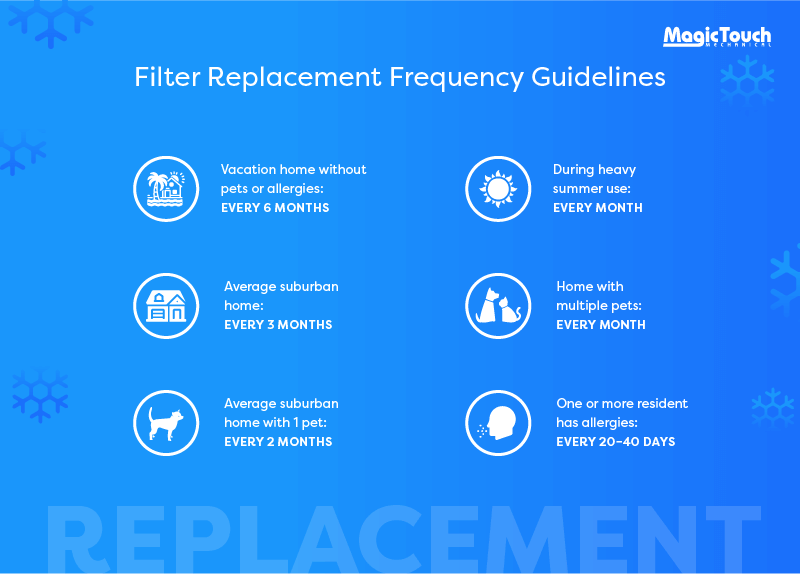
What Else Can You Do to Clean Your Air?
The internal filter is the most important factor if you want cleaner internal air. However, once you have a routine established for changing the filter, there are additional things that you can do to counter air pollution and improve air flow in your home.
- Air Scrubber/Purifier: Although these are often listed in the same breath as A/C filters, they are very different. Rather than filtering air as it passes through a membrane, an air scrubber proactively draws particulates out of your home’s air using an ionized field. These can be especially useful if you’re trying to counter tobacco smoke or odors in your home. An air scrubber can be an excellent addition to your air system if you have important concerns about indoor air purity due to an immune deficiency or sickness.
- Clean Ducts: If your air is forever circulating through dusty channels, you’re going to experience low air quality in your home. Many air conditioning professionals recommend duct cleaning every 5 years or so, to eliminate the dust that might settle within the ductwork of your HVAC system. However, we believe that there’s both more and less to it than that. If your ductwork is properly sealed, it shouldn’t need frequent cleanings. That being said, few homes have well-sealed ductwork. A thorough home energy audit can help improve the efficiency and cleanliness of your ductwork.
- Regular Maintenance: Annual tuneups and inspections can extend the life of your HVAC system, and provide you with the information that you need in order to conduct your regular home maintenance. During this check, we can also consult with you about your filtration needs and help you find a solution that will be best for your home and system.
Do you have questions about your air conditioner’s filtration system? Are you thinking of upgrading to a filter with a higher MERV rating, but need to check your static pressure first? Perhaps it’s simply time for a tune-up on your A/C unit, or you’re curious about what a home energy audit would reveal about your unit’s efficiency. Call Magic Touch Mechanical today. We have highly-trained indoor air quality specialists & BPI Certified Building Analysts on staff. We provide service, repair and installation on all types of air conditioning units throughout the Greater Phoenix area.
